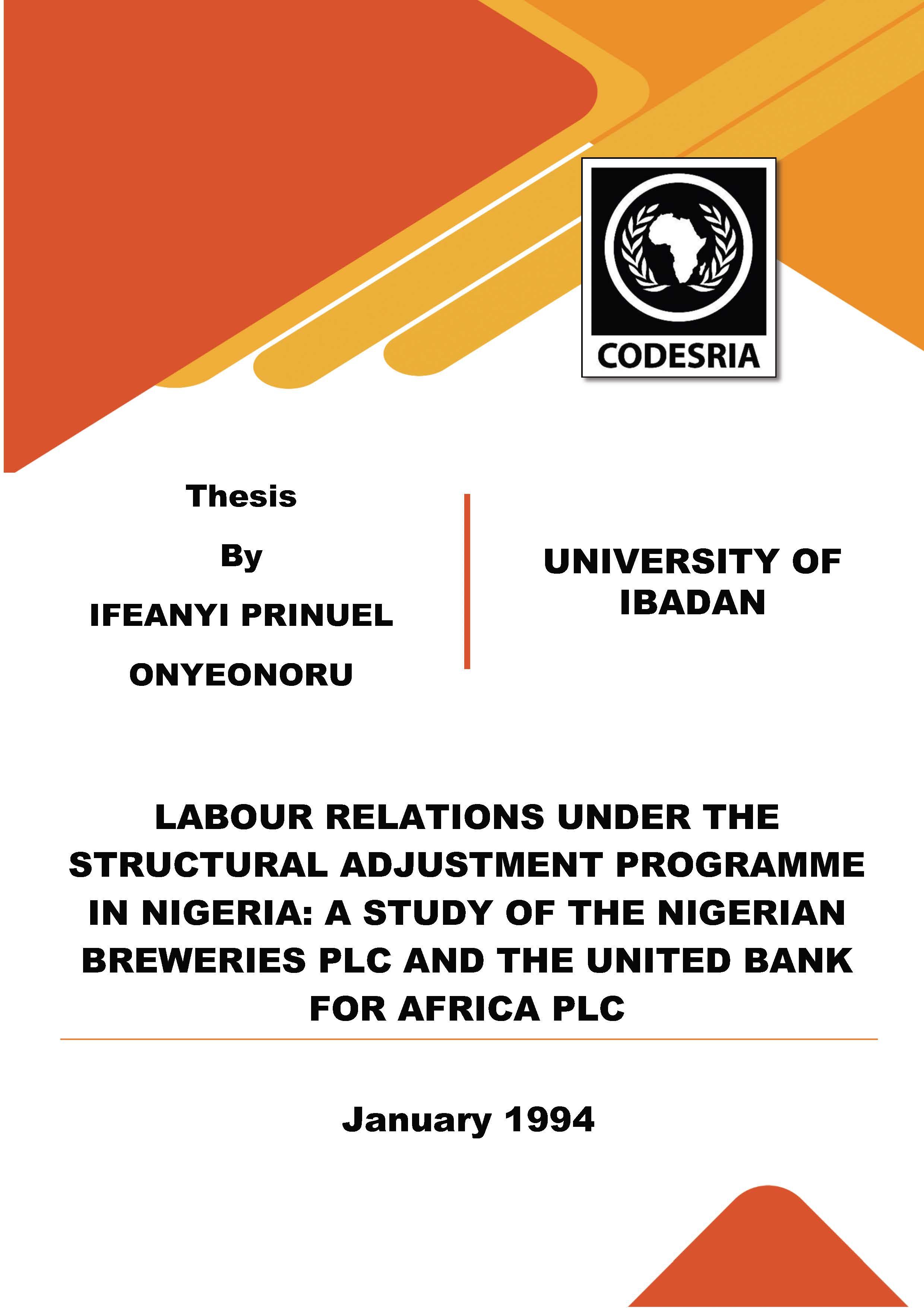LABOUR RELATIONS UNDER THE STRUCTURAL ADJUSTMENT PROGRAMME IN NIGERIA: A STUDY OF THE NIGERIAN BREWERIES PLC AND THE UNITED BANK FOR AFRICA PLC
Keywords:
LABOUR, STRUCTURAL ADJUSTMENT PROGRAMME, NIGERIAN BREWERIES PLC, AFRICA PLCSynopsis
This study is essentially an endeavour to assess the impact on labour relations, of the economic recession that began in the early 1980s, and the economic recovery programmes that accompanied it, with particular reference to the Structural Adjustment Programme. The study focusses on two important industries in the Nigerian economy - the Food, Beverage, and Tobacco industry, and the Bank:ing, Finance, and Insurance industry - as examplified by the Nigerian Breweries PLC (NBL), and the United Bank for Africa PLC (UBA). The results were obtained from the analysis of 344 questionnaires retrieved from the survey of employees in the two selected companies in Lagos and Ibadan. Other research methods ernployed for the study include oral interviews and the use of secondary data.
Findings from this study show that the two industries responded differently to the labour relations challenges thrown up by the Structural Adjustment Programme (SAP). While organized labour in the Food, Beverage and Tobacco industry preferred the declaration of disputes to strikes, that of the Banking, Finance, and Insurance industry was more militant in the pursuit of the wellbeing of its members, resulting in numerous strikes. The labour relations atmosphere at the firm levels were a reflection of that at the industry levels, with UBA recording far more work stoppages than NBL. Factors responsible for these were traceable to the varying labour market environments of the two industries under SAP. The findings also signify the uneven impact of SAP on the various sectors and subsectors of the Nigeriar1 economy. Generally, the Structural Adjustment Programme aggravated the industrial crisis within the period of economic recession covered in the study (1982 - 1991), due to the prevalent work relations that were unfavourable to workers. These were apparent in the low job satisfaction of employees found in the study.
Contrary to the withering of strikes position of the industrial relations orthoxy in Nigeria, strike activity during the period of economic reconstruction was found to "flourish", rather than "wither", while the strike pattern was found to be procyclical.
From the findings, I argue that a good understanding of indus trial relations, and adequate analysis and prediction of indus trial relations trends must proceed with a theoretical perspective whose emphasis is on political economy - largel y embodied in the marxian approach.
Downloads
References
Allen C., and G.Williams eds. Sociology of Developing Societies, London. Macmillan, 1982.
Aluko, S., "The Changing Value of the Naira" Management m Nigeria March/April 1985.
Anyaoku, E., "Impact of IMF-World Bank Policies on the People of Africa" in Bade Onimode (ed) The IMF, The world Bank and African Debt: The Economie Impact; Vol I. London Zed 1989.
Ayida, A. A} Reflections on Nigerian Development, Lagos. Malthouse and Heineman, 1987.
Bangura, Y., 11 Structural Adjustment and the Political Question" Review of African Political Economy. No. 37 Dec. 1986.
Baran, P. and P. Sweezy. Monopoly Capital Harmondsworth, Penguine 1968.
Beckman, B., "Empowerment or Repression? The World Bank and The Politics of African Adjustment". Paper to a symposium on the Social and Political Context of Structural Adjustment in Sub-Saharah Africa
Organized Jointly by The United Nations Research Institute for Social Development, The Scandinavian Institute of African Studies and The ·Chr. Michelsen Institute in Bergen, Norway, 17 - 19 October, 1990.






